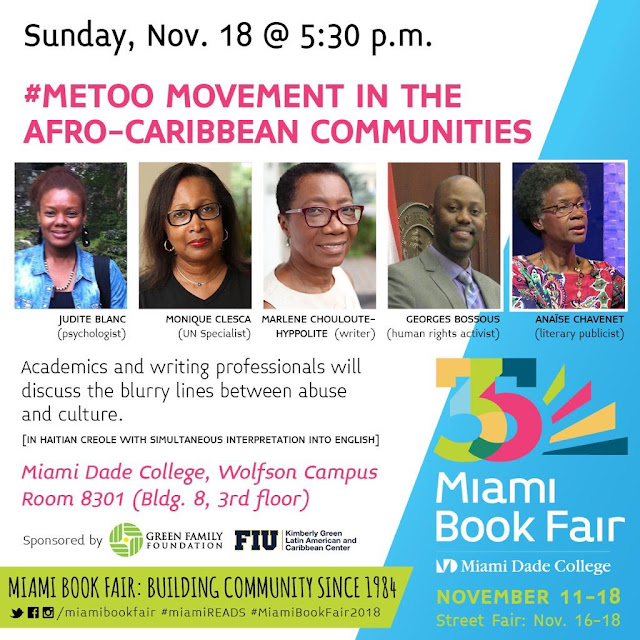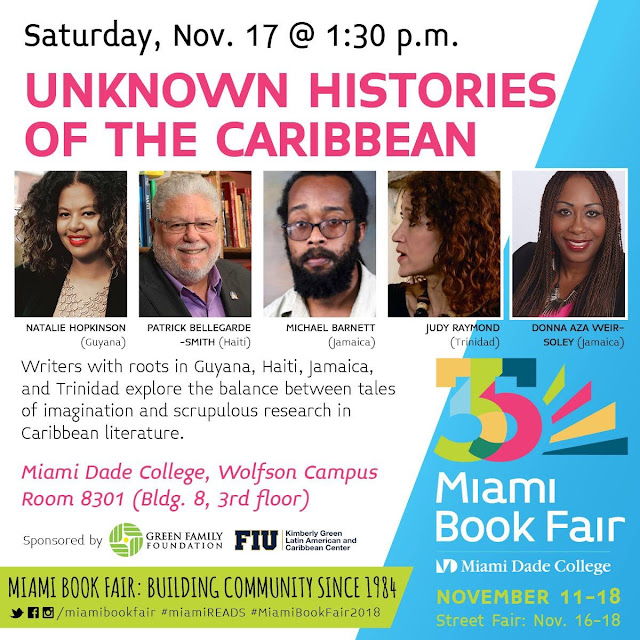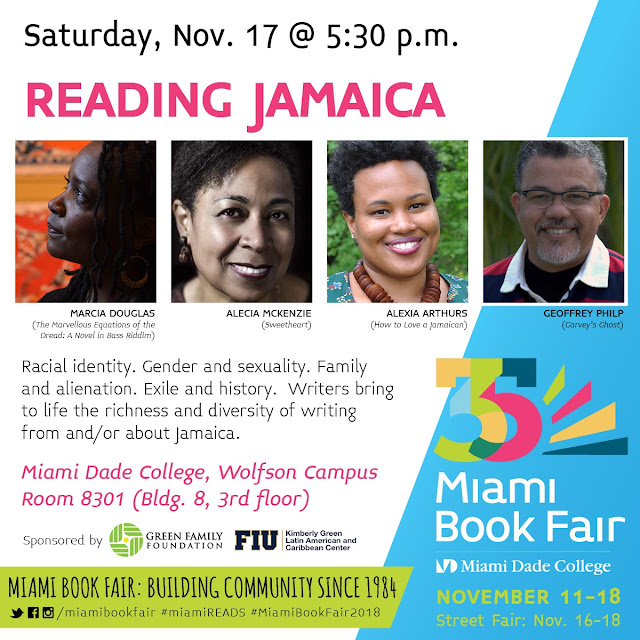ReadCaribbean programming features extensive Caribbean-specific events, including readings and panel discussions, storytelling for children, music and more, plus publishers at Street Fair. When appropriate, author events will take place in Creole or French with simultaneous translation into English.
A very special thank you to Jan Mapou, Myrtha Wroy, Jerry Delince, Cergine Cator, and Sherley Louis members, of Sosyete Koukouy who collaborate with Miami Book Fair on ReadCaribbean programs, including the Little Haiti Book Festival, that takes place annually in May. Established in 1985, Sosyete Koukouy is dedicated to preserving Haitian culture in the United States . Their mission is the preservation, perpetuation and presentation of Haitian cultural performances and exhibitions, to Creole and non-Creole-speaking audiences.
After Irma, After Maria: Caribbean
Women Writing the Storms
Saturday,
November 17 @ 11:30 am
Room 8301
[Building 8, 3rd Floor)
Modern
Caribbean literature captures not just the endemic mismanagement of natural
resources and public projects, but also the enduring chasm between promises of
progress through major infrastructures and the outcomes of natural disasters
for average citizens.
In this
panel, four Caribbean writers reflect on the devastation from Hurricanes Irma
and Maria to many Caribbean islands whose economies rely on tourism; they pay
considerable attention to the Caribbean bodies caught in the crosscurrents of a
catastrophic natural history. With Edwidge Danticat (Haiti), Loretta Collins
Klobah (Puerto Rico), Tiphanie Yanique (Virgin Islands), and Jessica
Pabón-Colón (Puerto Rico).
Unknown Histories of the Caribbean
Saturday,
November 17 @ 1:30 pm
Room 8301
[Building 8, 3rd Floor)
This panel
will discuss how writers from the Caribbean have attempted to construct
alternative images of the present and future from the histories of slavery and
colonialism that haunt the Caribbean and its diasporas. In parallel with these
invented stories, archival registers give unexpected details of the unknown
histories of the Caribbean and allow for scrupulously researched literary works
to emerge alongside tales of imagination.
With Natalie Hopkinson (Guyana),
author of A Mouth is Always Muzzled;
Patrick Bellegarde-Smith (Haiti), author of In
the Shadow of Powers; Dantes Bellegarde in Haitian Social Thought; Michael Barnett (Jamaica), author of The Rastafari Movement: A North American and
Caribbean Perspective, and Judy Raymond (Trinidad), author of The Colour of Shadows. Moderated by
Donna Aza Weir-Soley, author of Eroticism,
Spirituality, and Resistance in Black Women’s Writings.
Murder and Mayhem in the Caribbean
Saturday,
November 17 @ 3:30 pm
Room 8301
[Building 8, 3rd Floor)
Writers
with roots in Dominican Republic, Cuba, and Trinidad and Tobago present
masterful and unvarnished literary crime fiction and wildly transgressive noir
from the Caribbean. With Kevin Jared Hosein, The Repenters and The Beast
of Kukuyo; Hector Duarte Jr., Desperate
Times Call, and Nicholas Laughlin, editor of the anthology, So Many Islands. Moderated by Manny
Duran.
ReadCaribbean Presents Adventures
for Kids
Saturday,
November 17 @ 4:00 pm
Wembly's Author
Tent
Upper plaza
of Children’s Alley
Two friends
search for a long-lost quilt patch in Marjuan Canady’s Callaloo: The Trickster and the Magic Quilt; an Arctic seal tries
to get back home in Joanne C. Hillhouse’s Lost!,
and discoveries abound during a simple walk through the neighborhood in
Paula-Anne Porter Jones’ Sandy, Tosh and
the Moo Cow, and a family’s history comes alive in Francie Latour’s Auntie Luce’s Talking Paintings.
Reading Jamaica
Saturday,
November 17 @ 5:30 pm
Room 8301
[Building 8, 3rd Floor]
Reading
stories that explore such themes as racial identity, gender and sexuality,
family and alienation, exile and history, this panel brings to life the
richness and diversity of writing from and/or about Jamaica. With Marcia
Douglas, author of The Marvellous
Equations of the Dread: A Novel in Bass Riddim, Alecia McKenzie, author of Sweetheart, and Alexia Arthurs, author
of How to Love a Jamaican. Moderated
by Geoffrey Philp, author of Garvey’s
Ghost.
Haitian Identities and Caribbean
Aesthetics/ Idantite Ayisyen Ak Estetik Karibeyen
Sunday,
November 18 @ 11:30 am
Room 8301
[Building 8, 3rd Floor)
In English
with simultaneous interpretation into Haitian Creole
This panel
of four Haitian women writers will address the impact of their Haitian and
Haitian-American identity(ies) on their writing and the ways they navigate
(hyper)visibility and erasure to honor Caribbean aesthetics. Join Marilène
Phipps, author of Unseen Worlds;
Katia D. Ulysse, author of Mouths Don’t
Speak, and Fabienne Josaphat, author of Dancing
in the Baron’s Shadow, as they discuss the ways in which their writings
respond to cultural presumptions about Haitian identity. Moderated by Edwidge
Danticat.
Compelling Stories from the French
Caribbean/Des Histoires Captivantes de la CaraÏbe Française
Sunday,
November 18 @ 1:30 pm
Room 8301
[Building 8, 3rd Floor)
In French
with simultaneous interpretation into English
Writers
from the French Caribbean create and chisel narratives that are vibrant and
compelling as their Caribbean identity shapes and informs the stories they
choose to tell.
This panel
will focus on choices writers make in telling and reporting stories that embody
the depth and breadth of French-Caribbean life and imagination. With Gerty
Dambury (Guadeloupe), author of The
Restless; Mehdi Chalmers (Haiti),
author of À Partir du mensonge; Monique Clesca (Haiti), author of La Confession; and Serge Bilé
(Martinique), author of Yasuké (a
true story about the first recorded Japanese black samurai). Moderated by
Vanessa Selk, Cultural and Education Attaché (Florida and Puerto Rico) of the
Cultural Services of the French Embassy in the United States.
ReadCaribbean Presents Three
Groundbreaking Poets
Sunday,
November 18 @ 1:30 pm
Room 6100
[Building 6, 1st Floor]
Ruth Behar
explores the sacrifices of her exiled Cuban ancestors alongside her own
vulnerabilities in Everything I Kept/Todo
Lo Que Guardé. Loretta Collins Klobah reveals the secret heart of Puerto
Rico in Ricantations, where shiny
modernity gives way to spirit presences before and after Hurricane Maria. I Even Regret Night: Holi Songs of Demerara is
Rajiv Mohabir’s translation of the only known literary work written in 1916 by
an indentured servant in British Guyana.
The Realities of Haitian Migrations
Sunday,
November 18 @ 3:30 pm
Room 8301
[Building 8, 3rd Floor]
In Haitian
Creole with simultaneous interpretation into English
Individuals
who migrate often experience the loss of cultural norms, religious customs, and
social support systems. The adjustment to a new culture brings forth changes in
identity and concept of self. In the case of Haiti, how do these changes affect
the motherland – and the Haitian communities of the Diaspora?
In this
panel, academics and experts in the literary field will speak to the issue of
Haitian migration, racial, gender, and national identity, and ultimately, of
life in the balance. With Pauris Jean-Baptiste (writer), Pierre Buteau
(historian), Inéma Jeudi (journalist), and Claude Charles (ethnologist).
Moderated by Marleine Bastien, Executive Director of FANM
#MeToo Movement in the
Afro-Caribbean Communities
Sunday,
November 18 @ 5:30 pm
Room 8301
(Building 8, 3rd Floor)
In many
African-Caribbean communities, reactions to the #MeToo movement often reflect a
lack of adequate thought about abuse; in fact, these reactions can even indicate
increasing levels of gender-based violence as a norm. Women brave enough to
come out with their ordeals are often silenced or made to face backlash for
their choice to demand justice. Academics and writing professionals will
discuss the blurry lines between abuse and what is considered “normal” gender
relations and “natural”’ male behavior in Haiti and other African-Caribbean
countries, and present ideas on ways that literature can support the women in
impoverished/conflict countries. With Judite Blanc (research psychologist),
Monique Clesca (UN Specialist), Marlene Chouloute-Hyppolite (writer), and
Georges Bossous (human rights activist). Moderated by Anaïse Chavenet (literary
publicist). [In Haitian Creole with simultaneous interpretation into English]
 Mary was a young girl when she gave birth to a child in a strange place. She was not surrounded by women and midwives and probably went through her entire pregnancy with only Joseph by her side. How many days did she spend walking through fields, doing her chores in silence, and thinking about the child who was kicking and stretching inside her? For Jesus, like all other babies, demanded the full attention of his parents who did not have the traditional support systems.
Mary was a young girl when she gave birth to a child in a strange place. She was not surrounded by women and midwives and probably went through her entire pregnancy with only Joseph by her side. How many days did she spend walking through fields, doing her chores in silence, and thinking about the child who was kicking and stretching inside her? For Jesus, like all other babies, demanded the full attention of his parents who did not have the traditional support systems.![Reblog this post [with Zemanta]](https://img.zemanta.com/reblog_e.png?x-id=c164242d-8f0f-44e7-9e0b-f90066d84f37)












